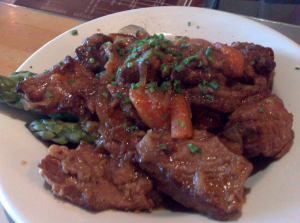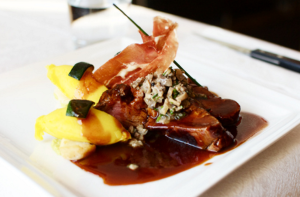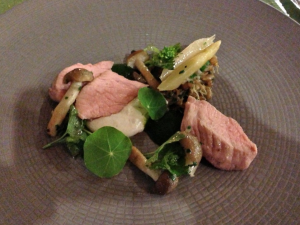Veal meat originates from calves, as opposed to beef which comes from older cattle. In most cases, veal meat comes from the young dairy cattle of the male sex younger than 20 weeks. Veal is high-quality meat and is more expensive than beef. While defining what is veal meat in biological terms is simple enough, what makes this topic interesting are all the different culinary applications of veal as well as its health benefits. There is a great number of dishes in which veal meat plays a crucial role and later in this article, we will take a look at some interesting recipes’ ideas.
Before proceeding with that part, however, we need to first consider some nutrition facts about the veal to understand the reasons why you should make it a part of your dietary habits, even if it belongs to the group of somewhat more expensive products on the market. Veal meat is very rich in different types of nutrients as well as minerals and proteins, which makes it a great choice to satisfy the required needs for red meat intake. One serving of veal can satisfy a big part of the recommended daily values intake.
Veal Nutrition facts

The information below is for one serving of veal of 290 g.
- Calories: 1862 – which represents 93% of recommended daily values
- Carbohydrates – 0 g
- Total fat – 194 – almost 300% of recommended daily intake. Of this value, 93.9 g belongs to saturated fat, which is 470% of recommended daily values.
- Protein – 27.3 g – or 55% of recommended daily values
As for vitamins, worth mentioning are:
- Niacin – 8.1 mg or 40% of recommended daily intake
- Vitamin B12 – 1.6 mcg – which is 27% of recommended daily value
- Riboflavin – 0.3 mg, 20% of recommended daily value.
When it comes to minerals, there are a few in which veal meat is very rich.
- Phosphorus – 336 mg, representing 34% of recommended daily value
- Iron – 2.9 mg or 16% of recommended daily value
- Potassium – 502 mg or 14% of recommended daily value
- Zinc – 2.5 mg or 17% of recommended daily value
Other minerals also found in veal include selenium, sodium, magnesium, and calcium.
This fact sheet makes it clear that veal is a great source of energy as it satisfies nearly the entire requirement for daily calories. At the same time, it is completely carbohydrates free. On the flip side, it is extremely rich in saturated fats, which means that despite all of its value, veal meat needs to be consumed in moderation and with proper planning.

Veal Liver Nutrition
Many people have wrong assumptions about the liver as they believe that it serves as the place in the body where toxins are stored. This assumption is, however, very wrong as it is the liver’s job to filter these toxins out of the organism and a healthy liver never stores any of them in either humans or cattle.
Toxins are in fact often stored in the fat tissue, while what gets stored in the liver is all the good stuff, like vitamins, folic acid, and different types of minerals. Veal liver is no different in this regard and it serves as a great source of healthy, necessary nutrients. Of course, it goes without saying that cattle that have been raised without using hormones or antibiotics is much better for you.
Veal liver nutrition facts for one 85 g serving
Calories: 164
Protein: 23.3 g
Total fat: 5.5 g
Cholesterol: 412 mg (quite high as it represents 137% of recommended daily value)
Carbohydrates: 3.8 g
Potassium: 300 mg
Sodium: 72 mg
The veal liver is very rich in all sorts of healthy nutrients, but it also represents a big source of cholesterol. Therefore, it needs to be included in your diet in moderation, especially if you already have high cholesterol problems.

Veal Meat Benefits
Now that we have an in-depth analysis of veal meat’s nutritious values, we can consider how this translates to benefits to our health. Our body requires food that is rich in nutrients because these nutrients are needed for all day-to-day operations, from the simplest ones to those more complex.
We have already mentioned how veal is a great source of calories. A good veal dish can keep you going for most of your daily activities even if your diet is not otherwise balanced.
Minerals contained in veal meat also contribute to a number of important functions. Zinc, for example, is crucial for the immune system and also plays a role in cognitive development. Phosphorus is the key ingredient for the development of your bones and teeth and it plays a role in how your body makes the protein necessary for the growth of your cells.
Potassium is responsible for blood pressure regulation and maintaining proper heart rhythm. Numerous studies suggest that people with blood pressure problems who increased their intake of potassium were able to lower blood pressure levels. Low potassium intake, on the other hand, can cause heart complications. Veal meat is a great and tasty source of this important mineral.
Veal Recipes
There are numerous recipes for various veal dishes out there for you to try at home. Depending on your general taste, some may be more appealing to you than others. We bring you just one idea that seems worth giving a try.
- Veal Marsala
- Necessary ingredients:
- Two pounds of veal cutlets
- One cup of flour
- Half a cup of butter
- Quarter a cup of Marsala wine
- Three-quarters of a pound of fresh mushrooms
- Half a tablespoon of salt
- Two tablespoons of olive oil
Preparation: Place the meat between sheets of waxed paper and beat it thin. Mix flour and salt and dredge cutlets in this mixture. Let it rest for 15 minutes. Melt butter on oil and cook cutlets on this until both sides turn brown. Add mushrooms, reduce heat to low, and let it cook for about 10 minutes more. Finally, add Marsala wine and leave it on low heat for another five minutes. Once the meat is tender, it is ready to serve while the sauce is still hot.
Image Rights
Images used via the creative commons version 2.0 license – https://creativecommons.org/licenses/by/2.0/
Image One by BoPuc – https://www.flickr.com/photos/bopuc/481784250/
Image Two by Marita – https://www.flickr.com/photos/marikoiv/5459550680/
Image Three by T.Tseng – https://www.flickr.com/photos/68147320@N02/9115441336/